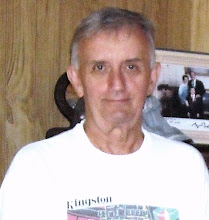Herd Journalism
I've used the term "herd journalism" over the years to mean just that: a herd of reporters following the same story in the same way.
My close attention to the happenings in Iraq over the last few weeks has given me a better understanding of the term. It is this: national and international news reporters take their leads on following a story from the way another reporter has already reported the same story.
The result is the reporter gets his or her story that is the same as the previous story, though it may be from a different source or sources. That is because the reporter asks the same questions the earlier reporter asked. The result is the same old story paraded onto the air or into the news columns as news--over and over and over again!
A good example came the other night when I saw Christiane You-know-who of CNN. She did a story on some part of Iraq, Sunni as I recall. When she finished her story: she did not have a new story. She had a re-hash of dozens of other stories along the same vein: that the Sunnis would not be voting in heavy numbers, if at all in the upcoming election. How many times had I heard that? Hundreds, probably.
So, I try to understand this? Why would she report the same story in the same way that someone else had already reported? I don't have a conclusion except to say she doesn't know what she's doing, she is burned-out or whoever gave her the assignment is burned out or bored or unimaginative.
I used to have a city editor who did that: he'd clip stories out of the afternoon paper (our competition) and hand them out to our reporters (which put out the morning paper). So, he did the same thing the news services are doing now.
A day or two after I saw that story by Christiane what's-her-name, I saw a story by the same reporter, or the start of it. I quickly flipped the channel because I already knew her story! All she had to do was say the first few words, and I had it. So, why keep following it?
A good example of what I mean in the last few days was the line or two about the low voting in the Sunni areas and how that might lead to a government in Iraq that was not representative enough of all its people. How many times have I read or heard that idea? Hundreds again.
Another "pick up line" in most of the stories is how the "Sunnis boycotted the election. I find that a little hard to believe since especially in areas like Mosul, terrorists had pasted signs all over the place warning people that if they tried to vote they would be killed. So, "boycott" does not seem the correct word, though it is used often as if it were fact.
Yet, I've seen dozens of stories pegged to that idea.
The ideas almost become "folklore," in a way, in that they are picked up, true or not, and then carried as true by every reporter who follows the same story.
Another good example of this was a story in USA Today not long ago which referred to hard feelings in Falluja towards the American soldiers because of an incident in which American soldiers killed "civilians." I remembered that story. I remember someone talking to the young American army lieutenant (though it could have been a Marine) who was there the night the Iraqis were killed by American fire. The army lieutenant described the situation where his unit had moved into a school. That act was followed by a protest by some shouting Iraqis---and some other Iraqis who lurked behind the shouting Iraqis who were armed and firing into the school at the Americans. The Americans returned fire and killed some of the Iraqis, maybe not all of those who'd fired the guns.
That whole idea, of the terrorists hiding in a school full of children or a group of civilians, and firing at Americans seems to be common among terrorists. It was in Vietnam, in Somalia, Kuwait and now Iraq.
I recall the young American lieutenant, in speaking about the night of the attacks on his unit in the school, describing the fight as being "like the battle of the Alamo."
Yet, the media continues, when it chances to mention the incident, portray it as an incident in which American soldiers killed innocent Iraqis. Give me a break!
Tips for reporters:
Don't look through the "clips" for background, pick up something that cannot be proven and build a story around it!
Get original. Do not believe anything anyone else has reported. Challenge anyone who tells you anything--to prove what they say. American, Iraqi, you name it. Don't challenge just to challenge, but challenge to try to get the truth which is often illusive.
Don't go into any story with a pre-conceived idea of what you will find. If you do, you will find it because your questions will follow that pre-conceived idea.
Don't lead every story out of Iraq with what the terrorists are doing! I'd like to know what the Americans, the Iraqis are doing, too. Most of the time, the terrorists are the lead and anything else is buried in the bottom of the story.
Don't take sides. Get both sides of a story or all sides of a story, and if your story is one that has already been reported 100 times, forget it! You got a bad tip! You are wasting my time and yours!

